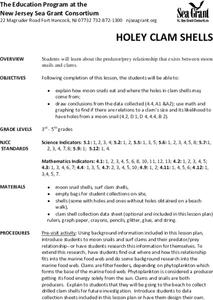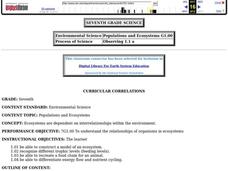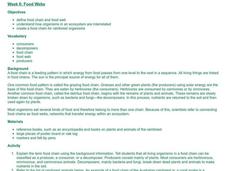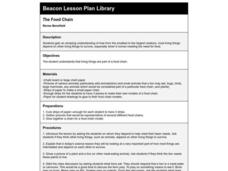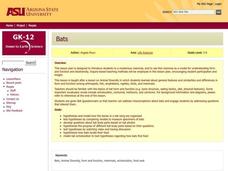Curated OER
Dinosaur Paleoecology: Determining the Diet of Ancient Animals
Students study dinosaur teeth and bones to determine the creatures diet, size and shape.
Curated OER
Holey Clamshells
Students analyze data to make hypotheses and conclusions regarding the predator/prey relationship between moon snail and surf clams.
Curated OER
Populations and Ecosystems
Sixth graders define terms prey, predator, and scavenger, describe predator-prey relationship, discuss effects of a lack of predators in an environment, and separate the role of the scavenger from that of the predator.
Curated OER
Populations and Ecosystems
Seventh graders create a model of an ecosystem and label it to show structure and function. They research the food web of an aquatic animal and also trace energy flow from the primary producer up the food chain.
Curated OER
Food Webs
Young scholars research rainforest animals and use that information to make a flow chart to show the order in which energy is transferred through several organisms. They label the producers, consumers, and decomposers in their chart.
Curated OER
Bearly Any Ice
Students participate in a prey-predator game. After reading background information, they discover the impact from the changes global warming presents to the polar bears and ringed seals. They role play the role of either the seal or...
Curated OER
Which One Matters?
Learners study the balance necessary to maintain ecosystems and how changing that balance can impact the ecosystem. They identify and discuss the need for balance in any ecosystem and discuss how greenhouse gases impact ecosystems.
Curated OER
Poisonous Dinosaur
In this dinosaur instructional activity, students read about the debate concerning the evidence for dinosaurs with poisonous saliva. Then students complete 4 short answer questions.
Curated OER
Food Chains
Students investigate the food chain. In this ecology lesson, students define producers and consumers. Students use organism cards to demonstrate how the food chain works.
Curated OER
Bats are Our Buddies!
In this bats worksheet, students click on the links in the questions about bats to find the answers to the questions and then come back and answer the questions. Students answer 19 questions total.
Curated OER
Dinosaurs
Students explore dinosaurs. In this science lesson, students discuss the characteristics of various dinosaurs and color masks and pictures of the dinosaur groups they have chosen.
Curated OER
Sunken Millions
This PowerPoint features a game based on the animal life. The interactive slides include 20 questions about animal needs, animal groups, and animal traits. The questions include multiple choice answers and 4 different levels of...
Curated OER
What's For Dinner?
Learners explore the food chain. They brainstorm and create a consumer-consumed food chains using magazine pictures and research materials. Students identify consumer-consumed relationships.
Curated OER
Forest Ecology
Learners examine the different plants and animals in British Columbia. In this forest ecology lesson students explore how ecosystems work, classify animals and investigate food webs and chains.
Curated OER
Shells
Sixth graders label diagrams of the 6 different classes of mollusks and explain the meaning of the labeled terms. They identify 8 common New Haven shells. They organize their own shell collection during this series of lessons.
Curated OER
Constructing A Food Web
Pupils identify and explain the relationships within a food web. They use index cards to glue pictures of producers and consumers. On the back of the card, students name the organism, list the type of biome in which it is found.
Curated OER
The Food Chain
First graders explore how most living things, big and small, need food for survival.
Curated OER
Who Is Eating Whom?
Students discuss the food chain and identify if various organisms are producers or consumers. They draw ten types of organisms and construct a food web of these organisms, labelling each as a producer or consumer.
Curated OER
Ecosystem Interactions Web
Students pick an ecosystem (forest, desert, coral reef, open ocean, grassland, mountain, savanna, etc.) and design an interaction web for their chosen ecosystem. Each group shares their ecosystem's web of life with the class.
Curated OER
Footprint Detectives: Making Inferences Using Dinosaur Trackways
Young scholars analyze and discuss footprints and dinosaur tracks. They listen to books about paleontologists, create and analyze their own trackways using black paper and chalk, examine the data, and form hypotheses about footprints and...
Curated OER
Ecology and The Endangered Species Act
Students listen to a lecture about the basics of Ecology. They take a field trip in which they observe a specific organism and their characteristics.
Curated OER
Insect Travel Brochure
Seventh graders study producers and consumers in habitats. They examine the trophic levels and how different organisms interact with a focus on insects. They create a travel brochure for an insect to visit a habitat which they create.
Curated OER
Bats
Students model how the bones in a bat wing are organized. They develop questions about bat body parts based on photographs. They hypothesize how bats locate their food.
Curated OER
Animal Riddles
Students research an animal using online research .They create a multimedia riddle using the information and share it with the class.
Other popular searches
- Carnivore +Herbivore(teeth)
- Herbivores Carnivores
- Carnivore Herbivore
- Omnivore Herbivore Carnivore
- Producers and Carnivores
- Herbivores and Carnivores
- Herbivore and Carnivore
- Herbivores. Carnivores
- Herbivore Carnivore Teeth
- Carnivores Omnivore Herbivores

